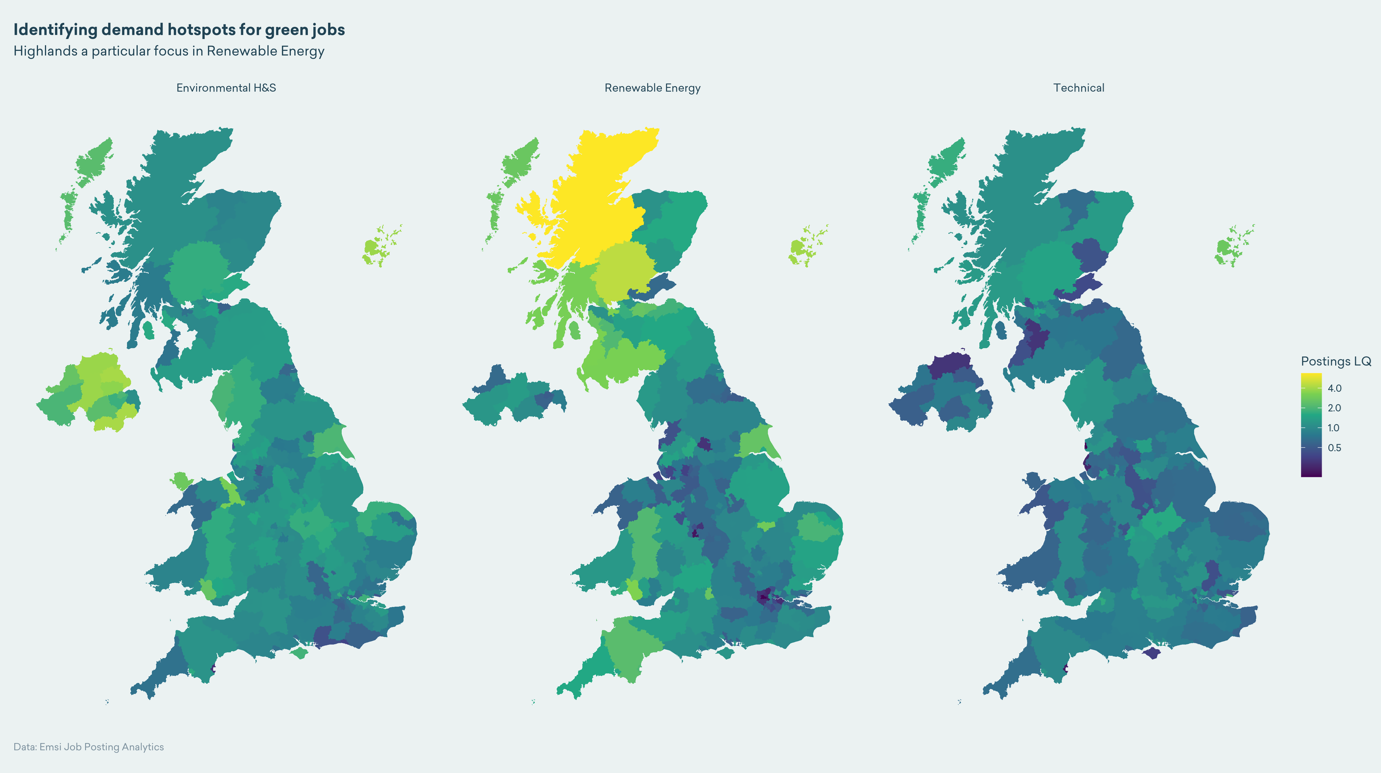Green jobs
We can help you unlock economic potential through data and insights
Navigating the economic and labour market changes required to achieve net zero is becoming central to the future livelihoods of people and communities right across the UK. But few local authorities, local enterprise partnerships, regional bodies and other sub-national bodies have the data and insight they need in their hands. We can help you change that, giving you the information you need to unlock opportunities to grow the skills and labour market to support green jobs and inclusive growth.
Providing the evidence base for your green economy strategy
Our partnership brings together an unrivalled collaboration that offers the data, insight and resources you need to understand, map and navigate the green economy in your area both now and in the future. Based on tried and tested methodologies and definitions, cutting-edge machine learning, robust economic principles and detailed policy understanding, we will give you what you need to grasp the green opportunity.
Find out more about our green jobs data package by emailing laura.osborne@wpieconomics.com. You can also listen to this episode of the Green Edge podcast, which explores what our partnership offers in more detail.

Essentially, being on the front foot matters:
- The green revolution must be faster than the digital revolution: If a net zero pathway is followed, the growth in the green economy over the next 10 years could be double that of the digital sector between 2009-2019 (8% per year versus 4%)[1]
- Opportunities and risks for local and regional bodies:
- If unshaped, this could exacerbate inequalities as the economy undergoes a structural transformation and many jobs fundamentally change
- However, there are substantial opportunities for regions and local areas to remodel their economies and help to create good, long-term and stable green jobs by getting ahead of the change.
We can help you understand the green economy opportunities in your area
Our partnership will identify for you:
- Companies currently active in the green economy in your area
- How fast elements of the green economy are growing in your area
- Which sectors of the economy will see substantial changes due to decarbonisation, and their scale
- What this means for skills and employment policy:
- Green policy areas likely to present the best future opportunities for residents
- Green policy areas that could be most significantly held back by skills shortages.

At the end of our collaboration, you will have:
1. A clear policy-orientated definition of the green economy
2. Access to a list of companies working in the green economy for one of the geographic areas described below for an initial period of 12 months:
- Regions
- Local Authorities
- Local Enterprise Partnerships
- Constituencies
3. The total number of green jobs in your area
4. The number of jobs in the 10 areas of the economy with the highest greenhouse gas emission intensity and/or overall contribution to national greenhouse gas emissions.
5. An assessment of the impact of decarbonising the economy on net jobs, based on overlaying the Committee on Climate Change’s macroeconomic analysis of the impacts of net zero to the sectoral employment pattern of your area
6. Analysis of the top green occupations and the associated green skills in your area
7. Takeaways from targeted interviews with local stakeholders on the implications of the greening economy for skills, employment, and wider green economy policy in your area
8. A 90-minute workshop with your employees to identify implications for employment, skills and wider green economy policy, and potential policy recommendations.
We can provide a wide range of bespoke further analysis for clients tailored to your specific needs. Contact laura.osborne@wpieconomics.com now so that together we can start shaping what you need for your area.

Webinar: Understanding the Emerging Green Economy
Recorded live, this webinar with Joe Ahern (WPI Economics), Alex Craven (The Data City) and Will Cookson (Lightcast) explains how we can help you create an evidence base.
Short on time? This blog from Lightcast summarises the event.
About the Partners
The Data City
The Data City is a UK Data Services SME that has developed a SaaS platform through which it has established the new standard in industrial classification, particularly focusing on the emerging economy. Working with government and private organisations, the platform allows policymakers, economists, investors and analysts among others to understand the economy and markets in real-time. Visit their website: www.thedatacity.com

Lightcast
Lightcast is the world’s leading authority on job skills, workforce talent, and labour market dynamics. Through our unparalleled data and insights, we are working with hundreds of organisations across the globe, helping them understand the dynamics of a rapidly changing workforce, illuminating the connections between the skills people have and the skills employers need, and ultimately empowering them to unlock new possibilities in their labour market. Headquartered in Boston, Massachusetts, and Moscow, Idaho, Lightcast is active in more than 30 countries and has offices in the United Kingdom, Italy, New Zealand, and India. Visit their website: www.lightcast.io

WPI Economics
At WPI Economics, we provide economics that people understand, policy consulting and data insight to help clients influence and drive better outcomes through improved public policy design and delivery. We work with a range of organisations – from FTSE companies, to SMEs, charities and Central and Local Government. Our focus is on important social, environmental and economic policy debates, such as poverty and inequality, net zero, levelling up and mental health. We are driven by a desire to make a difference, both through the work we do and by taking our responsibilities as a business seriously.
[1] An estimate from our report on green jobs and skills in London. Read our report summary here.


